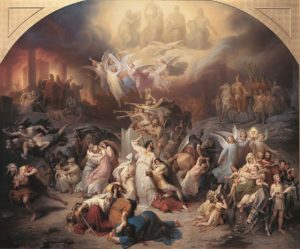Thoughts on Sunday’s Lessons for Nov. 17, 2019
First Reading (Track One): Isaiah 65:17-25
We are approaching the end of the long sequence of Sundays after Pentecost. Next week brings the celebration of Christ the King as the last Sunday after Pentecost. Then we move into Advent and a new Lectionary year.

Zerstörung Jerusalems durch Titus (The Destruction of Jerusalem by Titus, 1846), oil painting on canvas by Wilhelm von Kaulbach (1805-1874). Neue Pinakothek, Munich. (Click image to enlarge.)
In Sunday’s Track One first reading, we read the concluding verses of the book of Isaiah. The people have endured the loss of Jerusalem and the temple, spent years in exile, and finally returned to the shattered city and must begin the arduous task of rebuilding. Now the prophet celebrates God’s plan for the new Jerusalem, a joy and a delight. It will be a city with no weeping, no distress … no death in childbirth, no pain … joyous lives of 100 years of youthful strength! And, at the end, it is a holy place of peace, where the lion and the lamb rest together and none shall hurt or destroy.
First Reading (Track Two): Malachi 4:1-2a
The short book of Malachi, the last of the twelve so-called minor prophets, falls at the very end of the Hebrew Bible. The verses in Sunday’s Track Two first reading begin its fourth and final chapter. Malachi, whose name in Hebrew means “Messenger,” speaks of a people newly returned from exile, warning that the great day of the Lord is coming. In language that may remind us of the apocalyptic tone of the day’s Luke passage, the prophet warns that God will separate evildoers from the righteous and destroy them. Those who revere God’s name, though, will have healing and joy, “leaping like calves from the stall.”
Alternate Psalm (Track One): Canticle 9 (Isaiah 12:2-6)
In place of a Track One Psalm on Sunday we will chant these verses from earlier in Isaiah, a passage that may be familiar as Canticle 9, “The First Song of Isaiah,” that we read in Morning Prayer. Hard times lie ahead for the people at this point as they face exile, but the prophet makes clear that God will remain with them. Even in threatening times, even when we feel frightened and vulnerable, God will be our stronghold and our sure defense.
Psalm (Track Two): Psalm 98
In harmony with the prophet Malachi’s vision of God as a righteous healer, Sunday’s Track Two Psalm envisions God as fair and just judge of the world and all its people. When God comes to judge the earth we will sing a new song, lift up our voices, and express our joy so abundantly that even the sea, the lands, the rivers and the hills will jump up and join the celebration. God’s righteousness will be known to all the nations.
Second Reading: 2 Thessalonians 3:6-13
“Anyone unwilling to work should not eat.” Too often we hear this harsh judgment echoed in modern times, shorn of its context. In its original sense, this letter – written in Paul’s name in a time of Roman persecution – insists that all the members of the church in Thessalonika get up and pull their fair weight in a battle against an immediate challenge. Slacking would have been unfair and corrosive to a group that lived in community. But in no way does this negate Christ’s call to give food to the hungry, drink to the thirsty, or any of the other ways he calls us to show love to our neighbors.
Gospel: Luke 21:5-19
The evangelist we know as Luke wrote this scary forecast of war and destruction for a primarily Gentile audience some 70 years after the Crucifixion and 30 years after the Romans destroyed Jerusalem and the Temple. He is telling the searing story of an actual event, the fall of the Temple, framing it as a lesson taught by Jesus to his apostles during the week of his passion and death, just after a series of arguments with Pharisees and Sadducees. The story bears a truth as meaningful for us as for Christians in Luke’s own time of persecution: God is with us. Even when we’re betrayed, scorned, hated and hurt, “By our endurance we will gain our souls.”
What are “Track 1” and “Track 2”?
During the long green season after Pentecost, there are two tracks (or strands) each week for Old Testament readings. Within each track, there is a Psalm chosen to accompany the particular lesson.
The Revised Common Lectionary allows us to make use of either of these tracks, but once a track has been selected, it should be followed through to the end of the Pentecost season, rather than jumping back and forth between the two strands.
For more information from LectionaryPage.net, click here.
